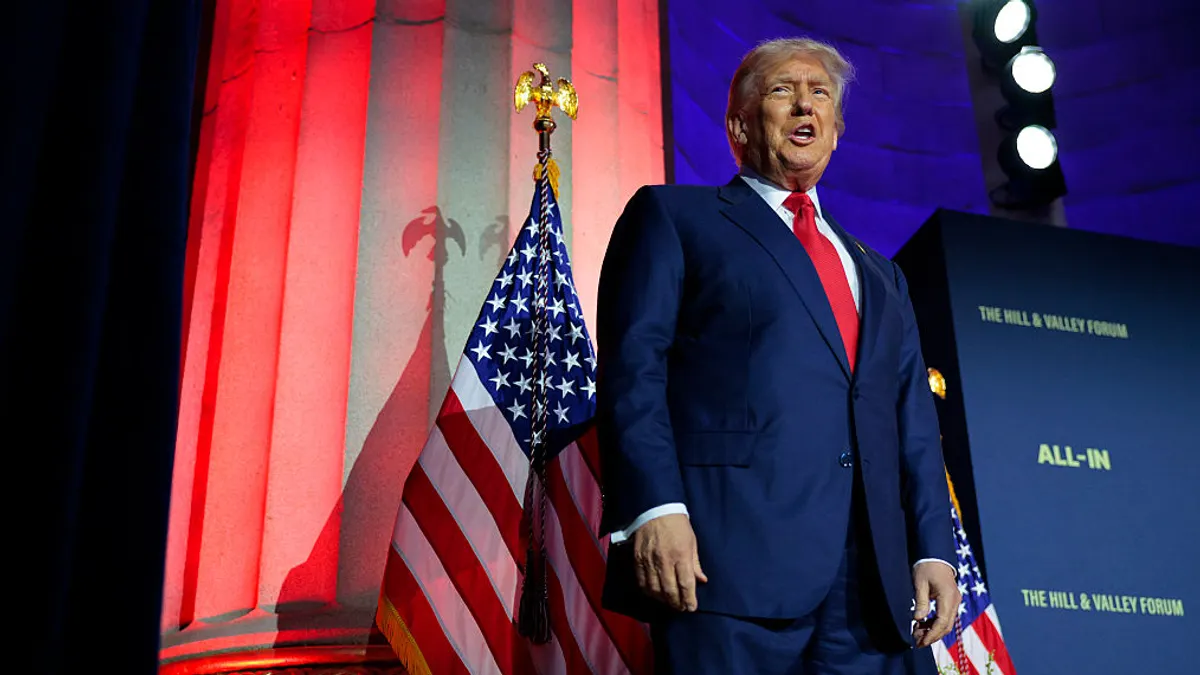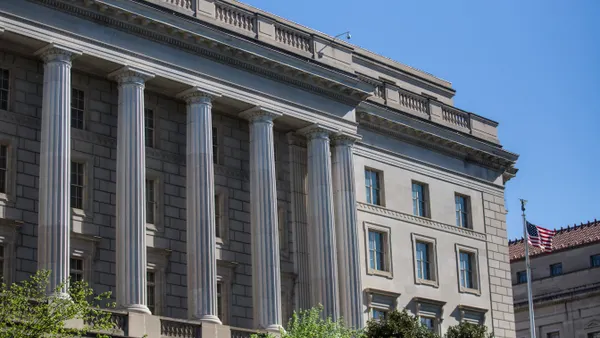Dive Brief:
- President Donald Trump’s recently unveiled artificial intelligence action plan gives federal agencies broad discretion to deny AI-related funds to states with “burdensome” rules on the technology, legal analysts and consumer advocates said.
- The plan is silent on exactly how the administration will define “burdensome” state AI regulations for the purpose of withholding such funds. It’s also unclear what type of “AI-related funds” might be covered.
- “It’s a significant threat,” Cody Venzke, senior policy counsel in the American Civil Liberity Union's National Political Advocacy Department, said in an interview. “A whole slew of funding might be in the crosshairs here because of how broadly the AI action plan is drafted.”
Dive Insight:
The plan, announced on July 23, outlines a number of steps the administration intends to take to drive AI innovation in the U.S., including cutting any “bureaucratic red tape” that could stifle the nascent market.
The plan states that AI-related federal funding should not be directed toward states with burdensome AI regulations “that waste these funds.” At the same time, the federal government should avoid interfering with states’ rights to pass “prudent laws that are not unduly restrictive to innovation,” according to the document.
“The government will have to establish clearer guidelines to enforce such broad avowals, and it could well face legal challenges if federal agencies attempt to withhold Congressionally appropriated funds,” attorneys at Crowell & Moring said in an analysis of the plan.
Trump has gone further than his own plan, calling for a federal AI standard that “supersedes all states.”
“If you are operating under 50 different sets of state laws, the most restrictive state of all will be the one that rules,” the president said at an AI summit in Washington hours after the plan was unveiled.
Trump has taken narrow steps to address the risks of AI. In May, the president signed into law the Take It Down Act, which criminalized the spread of nonconsensual intimate imagery, including AI-generated deepfakes and revenge porn. But Congress has so far failed to pass a comprehensive AI bill.
“There is no indication that efforts in the near future will be more successful, likely leaving federal agencies as the mechanism for the setting and enforcement of AI-related federal rules,” the Crowell & Moring attorneys said. “States, international bodies, and courts will also enforce their own AI-related rules and remedies.”
The plan “creates a challenging and uncertain compliance environment for companies, given that states are currently implementing the most far-reaching AI laws and regulations,” the attorneys wrote.
The administration’s plan calls on the White House Office of Science and Technology Policy to launch a request for information from the public about current federal regulations that hinder AI innovation and adoption and work with relevant U.S. agencies to take appropriate action.
The Office of Management and Budget is expected to work with federal agencies that have AI-related discretionary funding programs to ensure they consider a state’s AI regulatory climate when making funding decisions.
Under the plan, federal agencies have a “broad mandate” to consider state AI regulatory climates while allocating funding, according to an analysis by Wilson Sonsini Goodrich & Rosati attorneys.
“The Plan does not elaborate on what regulations would be considered ‘burdensome’ versus ‘prudent,’ and it does not specify which federal funds could be withheld,” the authors said.
A number of states have already enacted AI legislation governing safety and high-risk uses of AI, including Colorado, New York and Texas, they said.
Venzke said AI-related funding under the plan is “an incredibly broad bucket” that could potentially include funds for broadband deployment, K-12 education and state and local cybersecurity programs.
Similar concerns were raised by Grace Gedye, an AI policy analyst at Consumer Reports, a consumer advocacy group.
The plan “leaves states in a lurch; it’s unclear which state laws will be considered ‘burdensome’ and which federal funds are on the line,” Gedye said in a statement.















